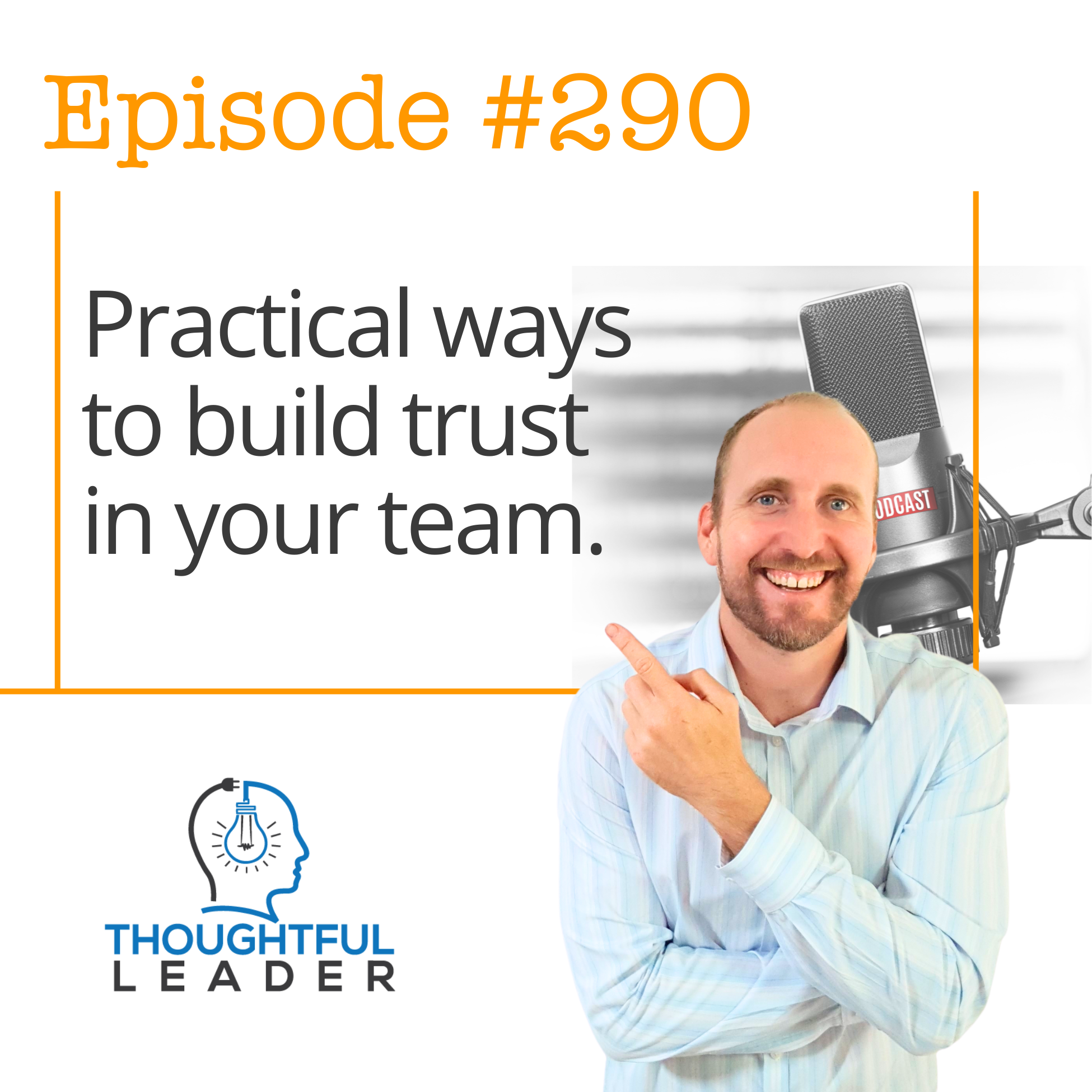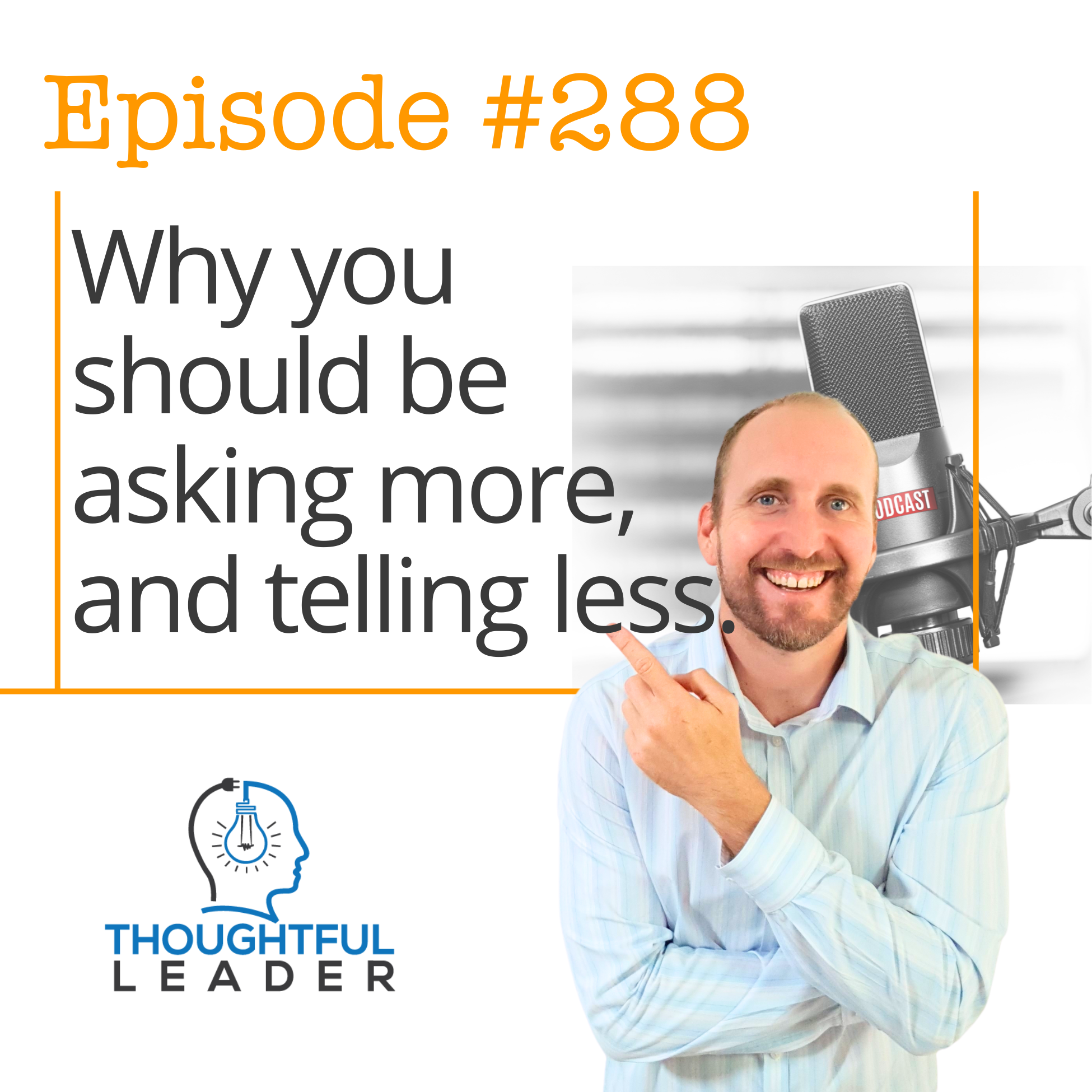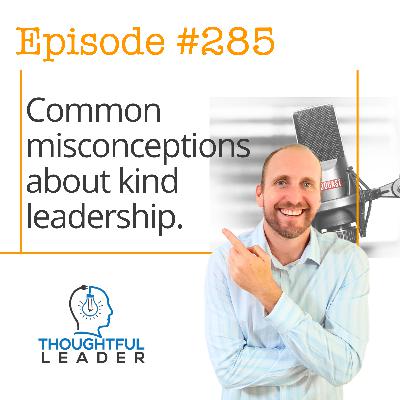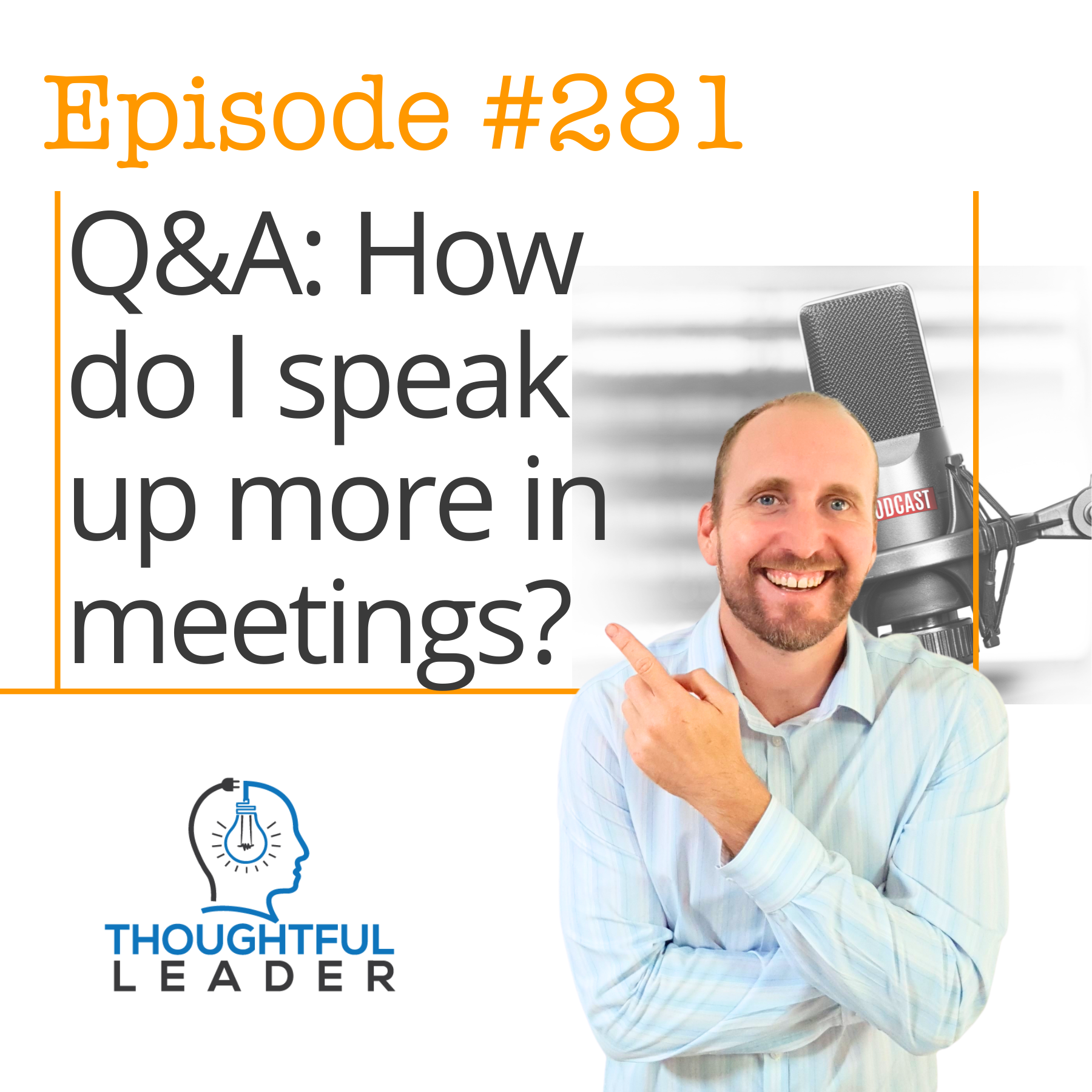Discover The Thoughtful Leader Podcast with Ben Brearley
The Thoughtful Leader Podcast with Ben Brearley

The Thoughtful Leader Podcast with Ben Brearley
Author: Ben Brearley
Subscribed: 57Played: 2,380Subscribe
Share
© Copyright 2025 Thoughtful Leader Pty Ltd
Description
Short, sharp and practical leadership support for thoughtful, reflective, people-focused leaders who want to lead with confidence, without pretending to be someone they’re not.
Hosted by leadership coach Ben Brearley, each episode helps you build confidence, set boundaries, and stay true to your values in the workplace. No jargon, no hype. Just real strategies for thoughtful leadership.
Hosted by leadership coach Ben Brearley, each episode helps you build confidence, set boundaries, and stay true to your values in the workplace. No jargon, no hype. Just real strategies for thoughtful leadership.
299 Episodes
Reverse
For the 300th episode, Ben tackles one of the most common challenges thoughtful leaders face: dealing with strong personalities at work. These colleagues may be direct, dominant, or results-focused - all traits that can feel intimidating or frustrating. Ben shares five practical tips, from avoiding direct confrontation to preparing well for interactions, so thoughtful leaders can hold their ground without trying to overcompensate or act like someone else. He reminds us that strong personalities aren’t bad, just different, and that with the right strategies, you can work alongside them effectively while staying true to your own leadership style. Resources mentioned in this episode: Article: Five Tips for Quiet Leaders. Thoughtful Leader Coaching - work with Ben 1 on 1.
AI tools like ChatGPT are everywhere, but what does that mean for thoughtful leaders? In this episode, Ben shares personal examples of using AI for marketing, podcasting, and even gardening - but he also issues a word of caution. Over-reliance on AI risks “deskilling” teams by removing valuable opportunities for learning and mentoring. Drawing on examples from law and medicine, he shows how bypassing junior staff development can have long-term consequences. Leaders can embrace AI, but must balance efficiency with the need to grow capable, confident teams. Resources mentioned in this episode: Book: The Skill Code by Matt Beane Thoughtful Leader Coaching - work with Ben 1 on 1.
Adapting your leadership style is essential but if you’re not careful, it can feel exhausting. In this episode, Ben explains how to shift your style to suit different situations - whether it’s being more direct in a crisis or more outgoing when networking, while keeping it sustainable. He draws on personality psychology research, including insights from Brian Little’s work on “personal projects,” to help leaders recognise when it’s worth stretching themselves and when to restore their energy. The goal: flexible, people-focused leadership that won’t compromise your wellbeing. Resources mentioned in this episode: Brian Little – Blog and information on Personal Projects. Brian Little – TED Talk - "who are you really?" Lead With Confidence by Understanding and Using Your Values – online course Thoughtful Leader Coaching - work with Ben 1 on 1.
In this episode, Ben explores why stability is such a powerful leadership trait. Drawing from his coaching and training experiences, he highlights how inconsistency erodes trust and creates uncertainty in teams. Ben shares his own routines, such as exercise, mindfulness, morning reading, and small rituals that help him maintain calm, dependable leadership, even under stress. He emphasises that your team needs to rely on you regardless of circumstances, and building stability through consistent habits is one of the best ways to lead with confidence. Resources mentioned in this episode: Thoughtful Leader Coaching: Work with Ben 1 on 1. The Useful Thinking Journal.
In this episode, we look at a common challenge for thoughtful leaders – taking too much responsibility for other people’s problems. Reflection and self-awareness are powerful strengths. But when reflection turns into overthinking and self-criticism, leaders can start to “own” problems that aren’t really theirs to solve. I explore why thoughtful leaders are prone to this, how it increases stress and disempowers both you and your team, and what you can do to set healthy boundaries. You’ll also hear why accountability must stay with the person who owns the issue, not with you as the leader. Resources mentioned in this episode: The Useful Thinking Journal – a helpful tool for reflection without slipping into unhelpful self-blame. Episode 259 – Why Leaders Should Have a Reflective Practice Article: When Team Members Won’t Take Accountability Leadership Coaching with Ben.
What happens when poor behaviour or performance goes unchecked at work? In this episode, I cover the risks of working in a consequence-free environment, where team members face no real impact for their actions. I share why “trying everything” often fails without accountability, and why feedback, formal warnings, or performance improvement plans can all be necessary tools. Consequences aren’t about punishment – they’re about giving people a reason to change, and creating fairness for the whole team. Resources mentioned in this episode: Team Accountability Builder Course Article: 6 Steps to Deal With Behaviour Issues in Your Team Leadership Coaching with Ben
A client once asked me a great question: “If my values are already part of who I am, why do I need to understand them better?” In this episode, I unpack the answer. Your values are always shaping your leadership, but when you understand them clearly, you can see what situations will help you thrive, and which will leave you drained or frustrated. With this awareness, you can prepare for challenges, choose the right environments, and stay true to what matters most. Resources mentioned in this episode: Lead With Confidence by Understanding and Using Your Values (Online Course) Leadership Coaching with Ben
Leadership credibility isn’t built overnight, and there are no tricks that you can use to be respected in meetings or other forums at work. In this episode, I talk about the real groundwork which often happens before you need people to listen to you. That’s all about building trust and credibility with your key stakeholders. I share how to identify who your most important stakeholders are, how to map their influence and interest, and how to grow strong relationships over time. This groundwork makes it easier to be heard and respected, no matter your leadership style. Resources mentioned in this episode: Stakeholder Management Tips for the Everyday Leader (Article) Episode: Why Leaders Must Set Boundaries at Work Leadership Coaching with Ben
If you’ve ever been told you’re “too nice” to lead, this episode is for you. Being a people-pleaser doesn’t disqualify you from being an effective leader. It just means you need to develop a few key skills to protect your energy and set clear expectations. In this episode, I talk about: Why people-pleasing can feel like the easier option How it undermines your leadership (and what to do about it) Small steps to lead more assertively without losing your empathy. Leadership isn’t about being harsh or cold, it’s about leading with care and clarity. Resources: 1:1 Coaching: Work with me The Useful Thinking Journal
Mindfulness can feel like a buzzword, but it’s also a powerful tool for thoughtful leadership. In this episode, I explore how mindfulness helps leaders become more self-aware, less reactive, and better equipped to respond under pressure. I also share my story of mindfulness, including how and why I started using it and the benefits that came when I did. You’ll learn: What mindfulness really means in a leadership context Simple ways to bring more awareness into your day How mindfulness supports better decision-making You don’t need to meditate for hours to see the benefits, just a small shift in awareness can make a big difference. Resources: 1:1 Coaching: Work with me Waking Up App by Sam Harris Headspace Guided meditations on Spotify – Search "guided meditation" The Useful Thinking Journal
Trust is the foundation of a strong team, but how do you actually build it? In this episode, I share simple, practical actions you can take as a leader to start strengthening trust, especially if you're leading a team that’s been through some change or challenge. I also introduce a handy "trust equation" to help you think about ways to build trust. You’ll hear: What trust really looks like at work (and how it shows up) Small behaviours that create safety and connection How to build trust when you’re new to a team Trust doesn't grow overnight, but with the right approach, it can build steadily. Resources: 1:1 Coaching: Work with me PRINT® Assessment – understand your team’s hidden drivers The Trust Equation – Trusted Advisor
What really makes a team high-performing? In this episode, I take a look at recent research, including findings from McKinsey and Google’s Project Aristotle - to unpack what separates great teams from average ones. You'll learn: The 5 key factors that define high-performing teams How psychological safety influences performance What you can do as a leader to create the right conditions You don’t need everything to be perfect to lead a strong team. You just need to focus on the right things. Resources: 1:1 Coaching: Work with me McKinsey article on high-performing teams – Article link. Google’s Project Aristotle – https://rework.withgoogle.com/en/guides/understanding-team-effectiveness Tuckman’s team development model: The 5 Stages of Team Development.
Leadership isn’t about having all the answers, it’s about helping your team find them. In this episode, I talk about why shifting towards a coaching approach - asking more and telling less - can improve your leadership. It’s not always easy, but it’s worth it. You’ll discover: What a coaching approach looks like in everyday leadership The benefits for your team: ownership, confidence, and better ideas; and The common fears leaders have about this approach (and how to overcome them). If you want your team to think for themselves, be more proactive, and feel invested, give this episode a try. Resources: Explore 1:1 leadership coaching: Leadership Coaching Page Blog: How Letting Go Will Help You Take Control Podcast: Simple Tips to Help You Coach Your People.
Many thoughtful leaders are introverted, and that’s not a weakness. It’s a strength. In this episode, I share my top five pieces of advice for introverted leaders. You don’t need to act like an extrovert to lead effectively. You just need to play to your strengths and manage your energy well. You’ll hear: How to protect your downtime so you don’t burn out Why being quieter doesn’t mean you can’t have presence; and Practical ways to feel more comfortable leading as your true self If you’ve ever felt like you need to be louder, more extroverted, or “different” to succeed in leadership, this episode will help you lead in a way that feels right for you. Resources: Ready to feel more comfortable and confident as a leader? Book a Coaching Conversation Blog: Why Leaders Must Set Boundaries at Work.
Ever reacted emotionally and regretted it? You’re not the only one! In this episode, I talk about the powerful concept of “the gap” – the space between your emotions and the response you choose to take. It’s a concept that helps you lead more calmly and effectively, even under pressure. You’ll learn: How Viktor Frankl’s experience inspired this simple but powerful leadership skill Practical ways to pause and choose your response in the moment; and How to avoid reacting emotionally in challenging work situations. If you’ve ever lost your cool or wish you handled a situation differently, this episode will give you tools to lead with more control and confidence. Resources: 1:1 coaching to build your confidence: Leadership Coaching Page Podcast episode: Simple Tips to Help You Coach Your People Tool: The Useful Thinking Journal – Reflect and build your self-awareness as a leader Book: Man’s Search for Meaning by Viktor Frankl. Waking Up App: A mindfulness and meditation resource by Sam Harris – Waking Up Website. Headspace app: Meditation resource - website.
Kind leadership isn’t about being nice all the time. It’s about leading with respect and care, without falling into the trap of people-pleasing. In this episode, I unpack some of the common misconceptions about kind leadership. Thoughtful leaders often gravitate towards kindness, but it can backfire if we confuse kindness with always saying yes or avoiding difficult conversations. You’ll hear: Why kindness doesn’t mean weakness The difference between being nice and being kind How to set boundaries and still be seen as a considerate leader Examples of how kind leadership can actually make your team stronger If you’re someone who cares about your team but sometimes struggles with setting expectations or saying no, this one’s for you. Resources: Explore 1:1 coaching to build your confidence as a thoughtful leader: Leadership Coaching Page Blog: How Letting Go Will Help You Take Control.
Ambitious team members can be exciting to lead, but they can also be tricky to manage. So how do you support them without burning out yourself? In this episode, I explore what to do when you’re leading someone with big goals, a strong drive, and a desire to move quickly. These employees often have great potential but without the right leadership, they can become frustrated, disengaged or even disruptive to your team. If you’ve got a team member who’s eager for more, this episode will help you navigate their energy in a healthy, productive way. What You’ll Learn: Common challenges leaders face with highly ambitious employees Three key principles to lead with clarity: honesty, accountability and follow-through How to help your team member see the real gap between where they are and where they want to go Why telling them to “just be patient” is usually a mistake Practical ways to give effective feedback and keep expectations clear 🎯 Key takeaway: You can support ambition without over-promising or overextending yourself. Leading well means being honest and realistic – while also being encouraging and fair. Resources & Links: 10 Simple and Effective Tips for Giving Feedback The Useful Thinking Journal Team Accountability Builder Online Course Episode 71 – A Simple Model for Team Motivation Episode 254 – Prioritising the Career Conversation Private Leadership Coaching 💭 Want more strategies like this? Subscribe to the Thoughtful Leader newsletter and get regular tips, tools and insights to help you lead with confidence – without losing yourself in the process.
Are you staying in a job that no longer supports you, just because you feel loyal to your team or unsure of your next step? It’s a common challenge for thoughtful leaders. In this episode, I explore why we sometimes stay too long in roles that aren’t working, and how to start thinking clearly about whether it’s time to move on. What You’ll Learn: Why staying to “protect” your team might actually hold everyone back How toxic leadership can damage your self-esteem and confidence Why trying to “fix” your boss or workplace can keep you stuck How to start deciding whether to stay or go – in a clear, grounded way. Resources & Links: The Iceberg Model of Human Behaviour The Useful Thinking Journal Working For an Insecure Manager? Here’s What to Do Work With Me 1:1. 💭 If you’re feeling stuck in a role that’s draining you, sign up for the Thoughtful Leader newsletter to get weekly support and tools that help you decide your next step – on your own terms.
Can you be a confident leader without being the loudest in the room? Absolutely. This is a common challenge for thoughtful, introspective leaders. We often feel pressure to be more outgoing or “on show” to be seen as confident. In this episode, I explore how to build genuine leadership confidence without changing who you are. What You’ll Learn: Why the “shoulds” are holding you back How to reframe what effective leadership really looks like Why it’s OK to be quieter – and how it can actually be a strength How to balance being your introverted self with the times you need to step up and speak out Resources & Links: The Useful Thinking Journal Leadership Confidence Online Course Episode 281 – Speaking Up in Meetings The PRINT® Assessment 💭 Want to build your confidence in a way that suits you? Join the Thoughtful Leader newsletter and get weekly tips and tools to help you lead with calm and clarity.
Feeling stuck in silence during meetings, even when you have something valuable to say? You’re not alone. In this episode, I respond to a listener question about how to speak up more in meetings – a common challenge for many thoughtful, quieter leaders. If you're someone who finds it hard to contribute when others are dominating the conversation, or you feel like everything worth saying has already been said, this one is for you. What You’ll Learn Why this is only a problem if someone sees it as a problem – like your manager Why relying on a more introvert-friendly workplace isn't always an option Simple preparation techniques to help you contribute with confidence How visualisation and practice can help you feel more comfortable when it’s time to speak. Resources & Links The Useful Thinking Journal – to support reflection and confidence Toastmasters – a safe space to practise public speaking Leadership Confidence Online Course – build presence and authority your way Thoughtful Leader Podcast #104 – Why Leaders Must Set Boundaries at Work 💭 Ready to lead with confidence, without pretending to be someone you’re not? Join the Thoughtful Leader newsletter for more practical tips.
























